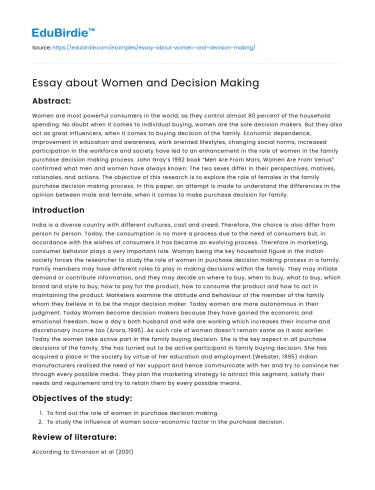Introduction
The role of women in decision-making processes has been a subject of increasing academic and societal interest. Historically marginalized in leadership roles, women are now emerging as pivotal players in various decision-making arenas, from corporate boardrooms to political offices. This shift not only reflects a progressive societal change but also underscores the multifaceted advantages that women's perspectives bring to decision-making processes. However, despite these advancements, numerous barriers continue to hinder women from fully exercising their decision-making potential. These barriers include entrenched gender biases, limited access to mentorship, and a lack of representation in key sectors. This essay explores the significance of women's participation in decision-making, examines the challenges they encounter, and considers the potential benefits of greater gender parity in leadership roles. By addressing counter-arguments and presenting empirical evidence, this analysis seeks to highlight the critical need for policies that support women's empowerment in decision-making contexts.
The Significance of Women's Participation in Decision-Making
Women's involvement in decision-making processes is crucial for fostering diversity and innovation. A study by McKinsey & Company (2018) indicates that companies with gender-diverse leadership teams are 21% more likely to experience above-average profitability. This finding suggests that the inclusion of women in decision-making roles can lead to more comprehensive and innovative solutions, as diverse teams are better equipped to consider a wider array of perspectives and ideas. Furthermore, women's participation in leadership roles can positively influence organizational culture by promoting inclusivity and equitable practices.
Despite these benefits, women's representation in decision-making positions remains disproportionately low. According to the World Economic Forum's Global Gender Gap Report (2020), women hold only 29% of senior management roles globally. This underrepresentation highlights the ongoing need for systemic changes to dismantle barriers that prevent women from accessing leadership positions. Enhancing women's participation in decision-making is not merely a matter of equity but also an economic imperative, as gender-diverse teams have been shown to outperform their less diverse counterparts.
Transitioning to a more gender-inclusive decision-making landscape requires concerted efforts from both the public and private sectors. Initiatives such as mentorship programs, leadership training, and policy reforms aimed at promoting gender equality are essential for empowering women to take on decision-making roles. By creating environments that support women's leadership, organizations and societies can harness the full potential of diverse perspectives, ultimately leading to more effective and sustainable outcomes.
Challenges Facing Women in Decision-Making Roles
Despite the acknowledged benefits of women in leadership, they continue to face significant obstacles that impede their full participation in decision-making processes. One of the primary challenges is the persistence of gender biases and stereotypes that question women's competence and leadership abilities. These biases are often deeply ingrained in organizational cultures and can manifest in various forms, such as unequal pay, limited career advancement opportunities, and exclusion from informal networks that are crucial for professional growth.
Another significant barrier is the lack of access to mentorship and networking opportunities, which are vital for career advancement. According to a report by LeanIn.Org and McKinsey & Company (2019), women are less likely than men to receive mentorship and sponsorship, which are critical for navigating organizational hierarchies and advancing to decision-making positions. This lack of support can hinder women's career progression and limit their ability to influence key decisions within their organizations.
The challenges facing women in decision-making roles are compounded by societal expectations related to work-life balance. Women are often expected to bear the primary responsibility for caregiving and household duties, which can limit their availability for leadership roles that demand significant time and commitment. Addressing these challenges requires a multifaceted approach, including policy interventions that promote work-life balance, organizational initiatives that foster inclusive cultures, and societal shifts in perceptions of gender roles.
Conclusion
The inclusion of women in decision-making processes is not only a matter of social justice but also a strategic advantage for organizations and societies aiming for sustainable growth. As women continue to break barriers and assume leadership roles, it is imperative to address the structural and cultural impediments that limit their full participation in decision-making. This involves challenging gender norms, implementing policies that promote gender equality, and creating supportive environments that enable women to thrive in leadership positions.
While progress has been made, the journey towards gender parity in decision-making is far from complete. By acknowledging and addressing the challenges women face, societies can move towards more equitable and inclusive decision-making processes that reflect the diverse perspectives and experiences of all individuals. Ultimately, empowering women in leadership roles is essential for fostering innovation, improving organizational performance, and achieving a more just and equitable world.






 Stuck on your essay?
Stuck on your essay?

